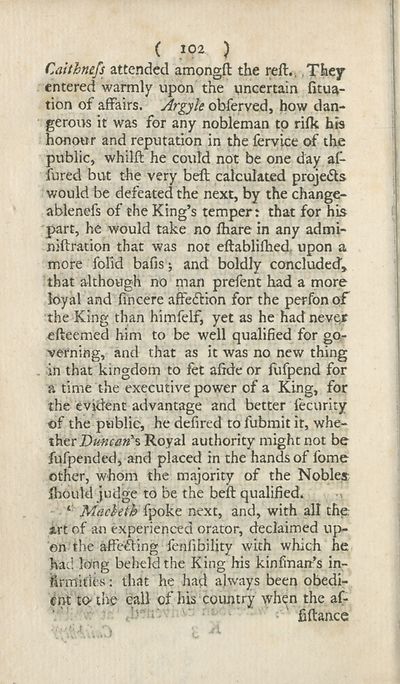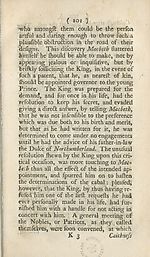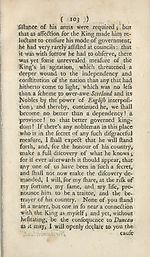Download files
Complete book:
Individual page:
Thumbnail gallery: Grid view | List view

( 102 )
Caitbnifs attended amongft the reft.. They
entered warmly upon the uncertain fitua-
tion of affairs. Argyh obferved, how dan¬
gerous it was for any nobleman to rilk his
honour and reputation in the fervice of the
public, whilft he could not be one day af-
fured but the very beft calculated proje&s
would be defeated the next, by the change-
ablenefs of the King’s temper: that for his
part, he would take no ftiare in any admi-
niftration that was not eftablifhed upon a
more fobd balls; and boldly concluded,
that although no man prefent had a more
loyal and fincere affe&ion for the perfonof
the King than himfelf, yet as he had neve.r
efteemed him to be well qualified for go¬
verning, and that as it was no new thing
in that kingdom to fet aftde or lufpend for
a time the executive power of a King, for
the evident advantage and better fecurity
of the public, he defired to fubmit it, whe¬
ther Royal authority might not be
fufpended, and placed in the hands of lome
other, whom the majority of the Nobles
fhould judge to be the beft qualified.
Macbeth fpoke next, and, with all the.
art of an experienced orator, declaimed up¬
on the affecting fenlibility with which he
had long beheld the King his kinfman’s in-
flrmit'fts: that he hacl always been obedi¬
ent to- the call of his country when the af-
fiftance
Caitbnifs attended amongft the reft.. They
entered warmly upon the uncertain fitua-
tion of affairs. Argyh obferved, how dan¬
gerous it was for any nobleman to rilk his
honour and reputation in the fervice of the
public, whilft he could not be one day af-
fured but the very beft calculated proje&s
would be defeated the next, by the change-
ablenefs of the King’s temper: that for his
part, he would take no ftiare in any admi-
niftration that was not eftablifhed upon a
more fobd balls; and boldly concluded,
that although no man prefent had a more
loyal and fincere affe&ion for the perfonof
the King than himfelf, yet as he had neve.r
efteemed him to be well qualified for go¬
verning, and that as it was no new thing
in that kingdom to fet aftde or lufpend for
a time the executive power of a King, for
the evident advantage and better fecurity
of the public, he defired to fubmit it, whe¬
ther Royal authority might not be
fufpended, and placed in the hands of lome
other, whom the majority of the Nobles
fhould judge to be the beft qualified.
Macbeth fpoke next, and, with all the.
art of an experienced orator, declaimed up¬
on the affecting fenlibility with which he
had long beheld the King his kinfman’s in-
flrmit'fts: that he hacl always been obedi¬
ent to- the call of his country when the af-
fiftance
Set display mode to:
![]() Universal Viewer |
Universal Viewer | ![]() Mirador |
Large image | Transcription
Mirador |
Large image | Transcription
| Antiquarian books of Scotland > Languages & literature > Key to the drama > (124) |
|---|
| Permanent URL | https://digital.nls.uk/122387204 |
|---|
| Description | Thousands of printed books from the Antiquarian Books of Scotland collection which dates from 1641 to the 1980s. The collection consists of 14,800 books which were published in Scotland or have a Scottish connection, e.g. through the author, printer or owner. Subjects covered include sport, education, diseases, adventure, occupations, Jacobites, politics and religion. Among the 29 languages represented are English, Gaelic, Italian, French, Russian and Swedish. |
|---|

